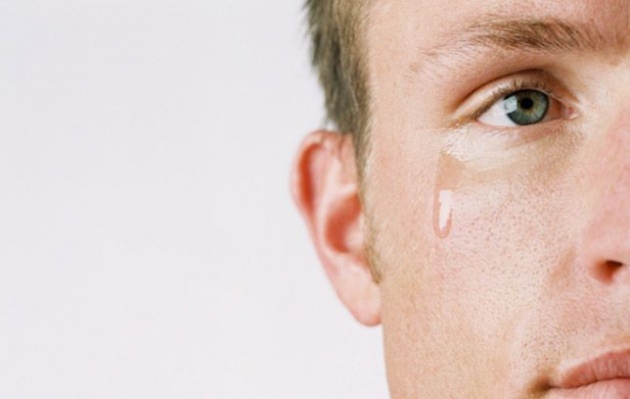
Humankind has spent much of its history trying to define what makes us different (and, by implication, soooo much better than) other animals. Is it our magnificently huge brains? Tell it to the cetaceans, pal. Tool use? Move over on that pedestal to make room for apes, monkeys, octopuses, and freakin’ crows. Bipedalism? This French cat begs to differ.
I hate to break it to you, fellow homo sapiens, but it isn’t the cool stuff we do that sets us apart. It’s the crying. Or at least the production of tears as a reaction to strong emotion.
Crocodiles fire up the waterworks pretty regularly, and nobody is entirely sure why. Some have speculated that their tears are to soften up food before consuming. Or it might be because their lacrimal ducts are squeezed when they open their jaws to eat a victim, and that produces tears. Whatever the reason, it sure ain't reptilian remorse. In the 1973 book Eyelids of Morning: The Mingled Destinies of Crocodiles and Men, by A.D. Graham and Peter Beard, an East African field researcher makes this observation about croc attacks: "We can be sure that any tears involved in these attacks are shed by men, not crocodiles."
What about our primate cousins? Monkeys, apes and other simians have nothing quite like our tears. They have tear ductsto help keep their eyes lubricated and clean. But they don't drain when they're sad. Chimps will scrunch up their faces and make noise when they’re in distress, but they don’t connect the tears and the wailing.
If you look at it from an outsider’s point of view, crying is pretty weird. We get upset and salt water comes pouring out of our faces, turning us into unwilling snot fountains as collateral damage. It must make baboons laugh their entirely functional big red swollen asses off. What is our deal, anyway?
One interesting clue is the fact that emotional tears have a different chemical makeup than plain old gee-it’s-dusty-out tears. Dr. William Frey, a biochemist and "tear expert"at the Ramsey Medical Center in Minneapolis, found that tears excreted during strong emotions contain stress hormones. So in some respects, you are literally crying away the stress. He also found that crying releases endorphins, which explains why having a good cry can leave you feeling refreshed and, well, happy.
Not everybody agrees that tears are loaded with endorphins. Ad Vingerhoets, Ph.D., a Dutch psychologist who has studied crying for 20 years—he's the author of books like Adult Cryingand Why Only Humans Weep: Unravelling the Mysteries of Tears—says that there might be a physiological mechanism involved; "maybe the release of oxytocin or endogenous opioids or stimulation of the parasympathetic branch of the autonomic nervous system," he says. "But I do not think that the tear ducts secrete these substances."
Instead, he thinks any relief might just be a response to how others react to your tears. "It may seem obvious," he says, "but you are more likely to feel better after you have received understanding and comfort, compared to after having received criticism and disapproval."
Whatever the reason we feel better after a good cry, it doesn’t really explain crying. Why not just pee that stuff out? Or have a beautifully expressive hurl?
Most scientists who have looked at the puzzle think it’s significant that crying happens on your face, where everyone can see it. The fact that you don’t cry out of your armpits suggests that human tears are a social signal, and there’s an evolutionary advantage to letting others in your group know that you’re bummed out.
Part of it—and probably one of the reasons some cultures disdain crying as a display of weakness—is that crying may have been a potent surrender flag at one point in our past, a clear signal that you don’t need to hurt me anymore, because I certainly won’t be hurting you. (Anything that stops a to-the-death fight with a fellow human is an evolutionary advantage for you in the short run, but also for the species overall in the long run. Let’s save those bloody deaths for the croc fights, thanks.)
Vingerhoets points out that tears are also an efficient way to let your fellow humans know from a (short) distance that gosh, that bone sticking out of your leg really does hurt and some assistance might be good at this time without having to howl and let every lioness in range know that catching dinner will be an easy jog this evening.
"Yes, this is a nice way to put it," Dr. Vingerhoets says. "In my view, it is not pain or sadness, but in particular the feeling of helplessness and the strong need for help that causes us to cry. Crying is extremely helpful to ascertain the help and succor of others. It seems to have a strong capacity to induce empathy."
And it's not always because we want them to protect us, or not inflict harm on us. The purpose of tears can change radically from culture to culture. As Dr. Vingerhoets points out, "there are certain tribes where people start to cry as a greeting ritual, rather than shaking hands."
Seeing someone else cry can help you get your priorities in order pronto. Female tears are a scientifically-proven bonerkiller for straight men. In a 2011 study conducted by the Weizmann Institute in Israel, men experienced a lowered sex drive and a reduced tendency to see women as attractive after being exposed to female tears. Presumably that’s so that even the biggest bozo will be able to lock it down and take care of immediate survival needs instead of trying to work in a quickie before that charging rhino gets here.
(Nobody seems to have tested what male tears do to straight women; being good at science doesn’t necessarily stop you from being good at sexism. Which is a potent reminder that crying can be triggered by frustration too.)
Kids and babies cry more often than adults, of course, and that’s where the universal primal distress signal really packs a punch. As upsetting as they can be, an infant’s tears may actually help with parental bonding—the parents get practice in reading and responding to little Theodore’s emotions, and Tad learns to trust that expressing a need gets it met.
There’s a theory that crying helps people empathize with each other in general, or at least helps other people know that your emotions are real. Think about the last time you saw someone express remorse without any sincerity behind it: You probably didn’t have a single thought for him beyond "fuck that guy," and rightly so. If you’re the one in that guy’s position, mustering up some tears to show you’re truly sorry just might get you forgiven and brought back into the fold.
So showing your tears every now and then helps you bond with your peers, relieves stress, and may just save you from getting your ass kicked. Rosie Grier and Roy Orbison were right all along. Grab a tissue and never question them again.



